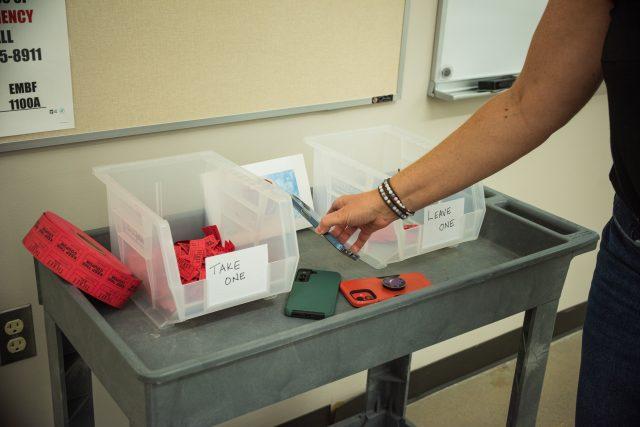KEYLA HOLMES
campus editor
keyla.holmes@my.tccd.edu
Professors at TCC are attempting to tackle the issue of students using phones during class lectures, some by enacting penalties and others by awarding prizes.
SE Geology Instructor Samantha Caputi said phones, or technology in general, bring a challenge to the classroom. For Caputi, there is a clear correlation between student success and phone use.
“Students who are always on their devices aren’t able to fully engage in class, and tend to not do as well as the students who can ignore their device.”
NE Public Speaking Instructor Jamie Kerr said when appropriately used in a class setting, phones can be an asset.
“Is there a place for them in the classroom?” she said. “Absolutely. There’s all kinds of ways we can harness technology. People essentially have a little computer in their hands that can be used for researching or other helpful methods.”
However, Kerr said when it comes to listening, devices can act as a noise that not only affects the person utilizing the technology, but those around them.
“Not only is it distracting for them, but they’re communicating to the teacher, group members, or whoever may be speaking that something else is more worthy of their attention, and I think that’s harmful,” she said.
She teaches public speaking, a class that requires students to stand in front of their peers and present. In this space, being a supportive audience member sends positive nonverbal messages to a classmate.
“Students start the semester with the full amount of ‘audience etiquette’ points, and lose points only when they engage in one of the behaviors that we decided was disrespectful or unsupportive,” she said.
Kerr said most students want to be attentive and supportive, but aren’t aware of the nonverbal messages they’re sending. Deducting points for audience ettiquete helps reinforce the importance.
Problems arise for Caputi when students use their phones to scroll through social media or respond to nonurgent text messages during class.
“I’ve had students admit to me that they are addicted to their phones and are unable to put them down for the length of a class,” she said. “They know that it hinders their learning and yet they still cannot resist the temptation to look at it during class.”
Unsure of what to do, Caputi is trying out a new method this semester to tackle the issue of phones during lectures.
“I decided for each class period that students decide to put their phones on a cart in front of class, they’ll receive a raffle ticket,” she said. “Periodically, I will draw a ticket or two from the bowl and give away small items such as candy, small mineral crystal samples, gift cards, and more.”
So far, her method has been making an impact.
“I honestly didn’t think students would be interested in this system, but they’ve surprised me,” she said. “Each class there are at least twelve students who willingly put their phone up.”
Caputi will have a drawing at the end of the semester for larger prizes. Even if it only helps out one or two students, she said it’s worth it.
Aside from prizes or an award system for distancing oneself from their device, NE student Michelle Sheng said an incentive to put devices away is that classes aren’t free.
“You’re paying money to attend these classes, so you shouldn’t be on your phone if you want to get as much as you can out of the class,” she said.
It may be hard to check something on a device and then put it away. For Sheng, she normally spends more time on her phone than initially intended.
“We all know the ‘I’ll just check something on my phone for two minutes, and then you go down fifty rabbit holes, and it’s five hours later,’” she said.
In regards to safety concerns, Kerr said having a phone close by works in the case of an emergency.
“I think a phone that I can grab to dial 911 in the case of an emergency or the campus police is super helpful, but I think that can happen when my phone is out of my hand and in close reach.”
For those who struggle with taking time away from their device, Sheng said you can practice detachment outside of class.
“You can say ‘okay, I’m going to set a timer for 20 minutes and I’m not going to look at my phone,’ she said. “The more comfortable you get, you can just add more time.”












































